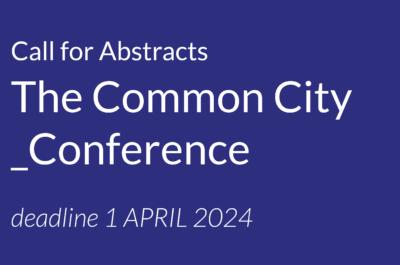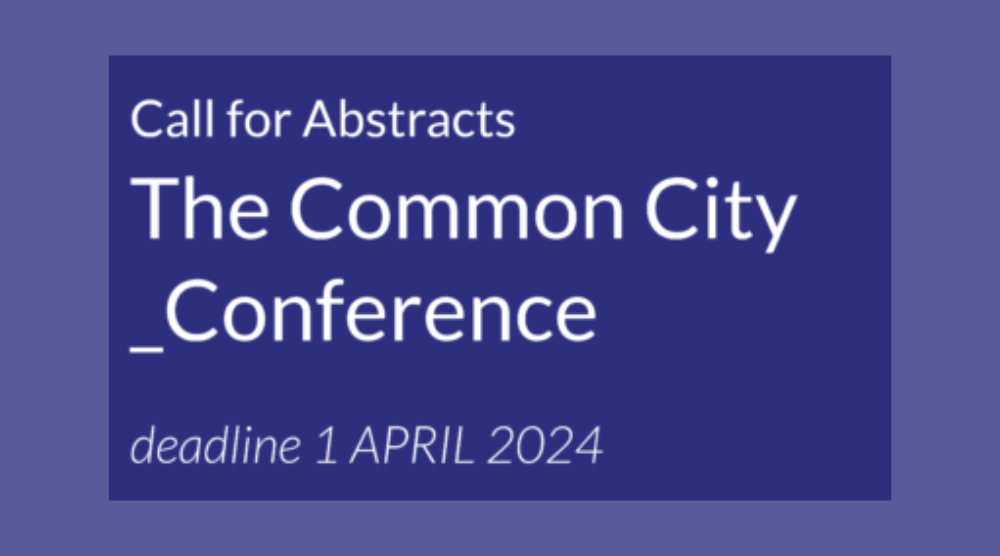Nos dias 11 a 13 de setembro, em Uppsala (Suécia), ocorrerá a The Common City Conference. O evento marcará o encerramento do projeto de cooperação entre a Universidade de Uppsala e a Escola de Arquitetura da Universidade Federal de Minas Gerais, desenvolvido desde 2019 (CAPES-STINT 2019-2024).
A Professora Dra. Rita Velloso (UFMG), pesquisadora do Núcleo Belo Horizonte do Observatório das Metrópoles, é uma das coordenadoras do projeto e conferencista do evento, juntamente com Don Mitchell, Irene Molina, Dominika Polanska e Miguel A. Martínez.
Como será produzida, criada, construída e imaginada a cidade comum do futuro? Como são vivenciadas as diferentes formas de comunidade urbana em todo o mundo? Que obstáculos e lutas devemos esperar na criação e promoção dos bens comuns urbanos? Quais são as principais condições facilitadoras, formas de organização e possíveis instituições para a manutenção dos bens comuns urbanos? Como podemos definir a cidade comum de forma a ajudar a superar as relações urbanas e sociais capitalistas? Até que ponto as lutas pelo direito à cidade e pela habitação e pela justiça urbana estão no centro da comunidade urbana?
Estas são questão que ocuparão as discussões do evento, que convida acadêmicos, ativistas individuais e coletivos envolvidos em estudos urbanos críticos a partilharem as suas ideias durante a conferência e iniciarem colaborações conjuntas (publicações, projetos de investigação, etc.).

Confira os prazos da chamada de trabalho:
- Prazo para envio de resumo (até 300 palavras): 1º de abril de 2024.
- Aceitação de propostas: 15 de abril de 2024.
- As inscrições estarão abertas até 30 de abril de 2024.
Taxa de inscrição: 100€ normal; 50€ para estudantes. As taxas podem ser dispensadas em casos justificados. Na inscrição estão inclusos 3 almoços e lanches.
Para qualquer dúvida, entre em contato com:
- Ilhan Kellecioglu – ilhan.kellecioglu@ibf.uu.se
- Mika Hyötyläinen – mika.hyotylainen@ibf.uu.se
A conferência está organizada em três vertentes:
1) Urban struggles for the right to the city and urban commons
We are interested in the analysis of grassroots struggles and social movements challenging the increasing commodification and authoritarian governance of urban spaces. The proliferation of neoliberal policies, the increasing gentrification of neighbourhoods, the commercialisation and privatization of housing stocks and public space, the displacement, home evictions, criminalisation and marginalisation faced by urban communities, are some of the targets of movements who, at the same time, claim the right to the city for the oppressed and help construct urban commons. We welcome international comparisons of such and other urban contestations. Submitted papers and presentations are expected to provide critical assessments and thick accounts of the movements’ features, structures, praxis and outcomes. A special focus on the theoretical frameworks, the specific contexts related to the case-studies, and the research findings is equally encouraged. In particular, we aim at advancing our understanding of the relationship between contentious politics (the conflicts between movements and their opponents) and the structural conditions (capitalist dynamics, intersectional/ reproductive structures, urban development, political opportunities, discursive/cultural struggles about hegemony, etc.) that constrain these conflicts.
2) Activist research: methodological reflexivity and practical experiences
Participatory, activist and militant approaches to develop socially engaged and critical scholarship in urban studies are currently more thriving and legitimised than ever. At the same time, they face cancellation from conventional and mainstream approaches (and political pundits alike). On the other hand, less radical and critically engaged approaches such as citizen and co-produced science do not necessarily lead to question the underlying hierarchies and inequalities that academic work can reproduce. Finally, residents, inhabitants, community organisers and activists may prefer more conventional and external forms of scientific knowledge than the promised ones by participatory-action research. In these sessions we expect to discuss new insights and experiences related to the relationship between grassroots activism and urban scholarship. Both reflective papers on methodological issues and critical appraisals of previous experiences are welcome. A specific focus on the labour and finances involved in such processes, time-space dimensions, risks of epistemic extractivism, achieved outcomes, collaborative methods, popular scientific education, and artivism/socially-engaged art, to name a few, can inspire the expected submissions.
3) Housing and Urban (In)Justice in Global North & South contexts
In this block, we are welcoming papers on social inequalities, marginalisation and oppressions that are especially manifested across urban settings, although not limited to them. In particular, we welcome papers addressing class, gender, ethnic/race, citizenship, ability and other dimensions of social cleavages that are expressed in residential conditions, housing inequalities, urban planning and the appropriation of spaces in towns, cities and large metropolitan areas. The scope and scale of land dispossession, displacement and exclusion from adequate housing and essential urban goods and services are multifarious nowadays. The roots of these phenomena are mostly located in power relations which, in turn, shape specific policies, political camps and grassroots social movements. They affect very different territories in the Global North and South, although there are also flows of people, commodities, information and capital that cross national boundaries under very unequal conditions framed by local, regional and global processes of accumulation by dispossession. The financialisation of capitalism adds gendered and racialised dimensions to an acute affordability housing crisis signed by privatisations, state disinvestment, skyrocketing energy costs, home evictions, homelessness, the loss of the commons and the formation of a new housing precariat. The exploitation of a racialized surplus work force, especially in, but not only the housing construction sector, is embedded in structural economic injustice. The current and accelerated environmental catastrophes, pandemics such as the Covid-19 and others, the rise of far-right political parties and governments, and ongoing devastating wars are important issues to address in the field of housing and urban inequalities.
Inscreva-se através de formulário online (CLIQUE AQUI).















